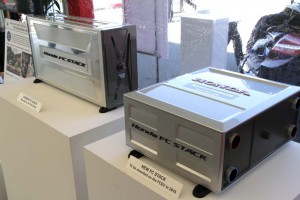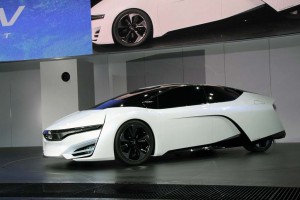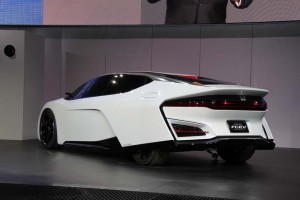Honda joined the unexpected resurgence in hydrogen power this week with the official unveiling of its FCEV fuel-cell vehicle concept car – the maker promising to put a final version into production by 2015.
Honda has been one of the longest and most consistent proponents of hydrogen power – which it sees as the most effective path to a zero-emission, petroleum-free future. The maker says recent developments have made fuel cell technology competitive with the internal combustion engine and a serious alternative to batteries – though officials acknowledge that there is an urgent need to create a hydrogen refueling infrastructure before the clean technology can truly go mass-market.
A vehicle like the Honda FCEV concept “is what we believe could be the ultimate solution to low-carbon mobility,” declared Tetsuo Iwamura, Honda Motor Co.’s top North American executive and COO of its global automotive operations. “At the same time,” he stressed, a vehicle like the FCEV can be “fun to drive and fun to own.”
The FCEV concept vehicle adopts an almost arrow-like shape that might seem more suited to a sci-fi film than today’s highways, the design intended to both reduce aerodynamic drag and increase the car’s visibility. Studies have shown that many green-minded motorists like to have a vehicle that stands out on the road – like the Toyota Prius hybrid. Nonetheless, several Honda officials acknowledged the design of the FCEV is “polarizing,” and will be toned down before production begins in less than two years.
What matters more, perhaps, is the new technology under the hood. In fact, Honda officials billed as a breakthrough the fact that the entire fuel cell system now can fit into a conventional engine compartment thanks to recent improvements in fuel cell “stack” design. The heart of the vehicle has shrunk by about a third compared to the previous version of the technology, Honda’s latest stack also delivering about 40% more power – at a “significant reduction in cost,” according to Iwamura.
Honda already bills itself as the first automaker to market a hydrogen vehicle to the public, having launched a limited leasing program for its earlier FCX Clarity fuel cell vehicle to the public several years ago. It now has about 100 of the vehicles on the road in Southern California, and a number of current customers attended the maker’s preview of the FCEV at the L.A. Auto Show.
“It’s just like a regular car,” said Gary Brahm, the Chancellor of Irvine, California’s Brandman University, who recently traded in his original Clarity for a second model that he found, “a little quicker and more fun to drive.”

Honda has sharply reduced the size of its latest fuel cell stack, right, compared to the older version, left, used in its current FCX clarity hydrogen car.
Selling the ease with which motorists can slip from a conventional, gas-powered vehicle into a hydrogen fuel-cell vehicle could prove critical to winning over potential buyers, and could be the significant selling point when compared to battery-electric vehicles. Honda noted that fuel-cell vehicles like the FCEV prototype can be refueled in as little as three minutes and deliver up to about 300 miles per tank – compared to the hours it takes to recharge a battery car which, in turn, typically yields less than 100 miles of range.
(Honda emphasizes turbocharging, engine downsizing. For more, Click Here.)
The big problem is the lack of a hydrogen infrastructure – there are perhaps a dozen or so stations in all of California today – though the California legislature has approved funding expected to grow that to 100 by the end of the decade, and similar programs are underway in other likely markets, including Germany and Japan.
While Honda officials – like those from Toyota and Hyundai, which also announced fuel cell vehicle production plans this week – say hydrogen power is ready for prime time, they are planning to continue working to improve the technology. In fact, Honda earlier this year launched a joint venture program with General Motors. The Detroit maker has also been a long-time advocate of the technology.
(Click Here to get a look at the Honda NSX drivetrain.)
Though Honda plans to take fuel cell power “mass market,” the maker is providing few specifics about its 2015 program. And, several observers suggest, its original plans might now have to change – at least when it comes to pricing – as a result of this week’s announcement from Hyundai which will begin leasing a hydrogen-powered version of its Tucson SUV for $2,999 down and $499 a month for three years. Significantly, Hyundai’s lease price will include all the fuel a motorist could use. That could set an industry precedent.



Apparently like with hybrids, if you’re going to show a hydrogen fuel cell car it has to be as FUGLY of a design as possible to get people’s attention… What insanity!